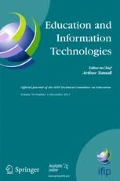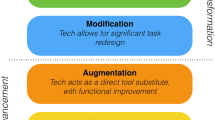Abstract
It is argued that today is an information driven society. Being able to engage digital information abilities to solve an information interaction activity within digital environments is key for social participation, equality and for bridging socio-economic and cultural gaps. Developing these abilities within school classrooms has become a priority. However, research suggest that a majority of students can only complete basic and explicit information-gathering and management tasks within digital environments. Literature constantly holds that students’ expressed experiences of information interaction activities are key for developing digital information abilities. Notwithstanding, there are still important gaps within our understanding of students’ expressed experiences of them. To address such gaps we employ phenomenography to study Chile’s Secondary Technical and Vocational Education and Training students’ expressed experiences of information interaction abilities; a group that has likewise been overlooked. By means of purposeful sampling, a total of 24 students participated in the study. Focusing on both the out-of and in-school settings, findings suggest that the apparent clear-cut division between the out-of and in-school experiencing seems not to be as pristine as some might suggest. Findings also indicate that specialty courses, as they are currently designed, might not be favorable for developing digital information abilities as well as pointing towards the importance of situating students’ expressed experiences within wider discourses surrounding digital ability development.


Similar content being viewed by others
Data Availability
This study was approved by the Pontificia Universidad Católica de Chile’s Ethical Committee Board. As stipulated by them, data supporting findings is securely stored by the authors.
References
Anderson, R. (2008). Implications of the information and knowledge Society for Education. In J. Voogt & G. Knezek (Eds.), International handbook of information Technology in Primary and Secondary Education (Vol. 20, pp. 5–22). Boston: Springer.
Bellei, C., Bilbao, A., Contreras, D., Donoso, G., Garrido, J., Hinostroza, J., et al. (2010). El Libro Abierto De la Informática Educativa, Lecciones y Desafíos de la Red Enalces (I ed.). Santiago de Chile: Enlaces, Centro de Educación y Tecnología del Ministerio de Educación.
Boon, S., Johnston, B., & Webber, S. (2007). A phenomenographic study of English faculty's conceptions of information literacy. Journal of Documentation, 63(2), 204–228.
Bowden, J., & Green, P. (2005). Doing developmental Phenomenography. Australia: RMIT University Press Melbourne.
Care, E., Griffin, P., Hesse, F., Buder, J., Sassenberg, K., Wilson, M., … Zoanetti, N. (2015). Assessment and Teaching of 21st Century Skills. Methods and Approach. In P. Griffin & E. Care (Eds.), (I ed., pp. 310).
Castells, M. (2010). The Information Age: Economy Society and Culture Volume I [kindle]The Rise of The Network Society (Vol. I, pp. 499).
Claro, M., Preiss, D. D., San Martin, E., Jara, I., Hinostroza, J. E., Valenzuela, S., et al. (2012). Assessment of 21st century ICT skills in Chile: Test design and results from high school level students. Computers & Education, 59(3), 1042–1053. https://doi.org/10.1016/j.compedu.2012.04.004.
Cibangu, S., & Hepworth, M. (2016). The uses of phenomenology and phenomenography: A critical review. Library & Information Sience Research, 38, 148–160.
Cramer, M., & Hayes, G. R. (2010). Acceptable use of Technology in Schools: Risks, policies, and promises. IEEE Pervasive Computing, 9(3), 37–44. https://doi.org/10.1109/mprv.2010.42.
Diehm, R., & Lupton, M. (2012). Approaches to learning information literacy: A Phenomenographic study. Journal of Academic Librarianship, 38(4), 217–225.
Diehm, R., & Lupton, M. (2014). Learning information literacy. Information Research-an International Electronic Journal, 19(1), 15.
Dubet, F., & Martuccelli, D. (1998). El mundo de los escolares. In En La Escuela Sociología de la experiencia escolar (pp. 87–126). Spain: Editorial Losada S.A.
Enlaces (2016). Enlaces: Quiénes Somos. http://www.enlaces.cl/sobre-enlaces/quienes-somos/
Erstad, O. (2012). The learning lives of digital youth-beyond the formal and informal. Oxford Review of Education, 38(1), 25–43. https://doi.org/10.1080/03054985.2011.577940.
Ertmer, P. A., & Newby, T. J. (2013). Article update: Behaviorism, Cognitivism, constructivism: Comparing critical features from an instructional design perspective. Performance Improvement Quarterly, 26(2), 43–71.
Ferrari, A. (2013). DIGCOMP: A Framework for Developing and Understanding Digital Competence in Europe (Y. P. a. B. N. Brecko Ed.): Joint research Center of the European Commission.
Fiore, S., Graesser, A., Greiff, S., Griffin, P., Gong, B., Kyllonen, P., … von Davier, A. (2017). Collaborative problem solving: National Assessment of educational Progress. USA: U.S. Department of Education.
Foucault, M. (1978). Dialogue on power. Los Angeles: Chez Foucault.
Foucault, M. (1980). Truth and power. In C. Gordon (Ed.), Power/knowledge: Selected interviews and other writings 1972–1977 (pp. 109–133). New York: Pantheon Books.
Fraillon, J., Ainley, J., Schulz, W., Friedman, T., & Gebhardt, E. (2014). Preparing for Life In a Digital Age. The IEA International Computer and Information Literacy Study International Report(I ed., pp. 307).
Fraillon, J., Aniley, J., Schulz, W., Friedman, T. & Duckworth, D., (2019). Preparing for Life in a Digital World. The IEA International Computer and Information Literacy Study 2018 International Report (pp. 297).
Griffin, P., McGaw, B., & Care, E. (2012). Assessment and Teaching of 21st Century Skills (I ed. Vol. I): Springer Netherlands.
Hague, C., & Payton, S. (2010). Digital literacy across the curriculum. United Kingdom: British Educational Communications and Technology Agency (Becta).
Hauge, C., & Williamson, B. (2009). Digital participation, digital literacy, and school subjects. In (pp. 28). Bristol, UK: FutureLab innovation in education.
Hughes, J. M. (2017). Digital making with "at-risk" youth. International Journal of Information and Learning Technology, 34(2), 102–113. https://doi.org/10.1108/ijilt-08-2016-0037.
Husserl, E. (1962). Ideas : General introduction to pure phenomenology. New York: Collier Books.
Jørgensen, M., & Phillips, L. (2002). Discourse analysis as theory and method. London, United Kingdom: SAGE Publications.
Kalas, I., Bannayan, H., Conery, L., Laval, E., Laurillard, D., Lim, C., … Turcsanyi-Szabo, M. (2012). ICT in primary education an analytical survey. Russian Federation: UNESCO.
Kang, I., Choi, J. I., & Chang, K. (2007). Constructivist research in educational technology: A retrospective view and future prospects. Asia Pacific Education Review, 8(3), 397–412. https://doi.org/10.1007/bf03026469.
Kotsik, B., Tokareva, N., Boutin, F., & Chinien, C. (2009). ICT application in TVET. In R. Maclean & D. Wilson (Eds.), International handbook of education for the changing world of work: Bridging academic and vocational learning (pp. 1879–1894). Dordrecht: Springer Netherlands.
Lareau, A. (2003). Unequal childhoods: Class, race, and family life (2nd ed.). United States of America: University of California Press.
Lather, P. (2006). Paradigm proliferation as a good thing to think with: Teaching research in education as a wild profusion. International Journal of Qualitative Studies in Education, 19(1), 35–57.
Limberg, L. (2000). Phenomenography: A relational approach to research on information needs, seeking and use. The New Review of Information Behaviour Research, 1, 51–67.
Lundh, A., Limberg, L., & Lloyd, A. (2013). Swapping settings: Researching information literacy in workplace and in educational contexts. Information Research, 18(3), 1–14.
Macklin, A. (2008). A PBL approach for teaching complex information and communication technology (ICT) skills in higher education. Community & Junior College Libraries, 14(4), 233–249. https://doi.org/10.1080/02763910802336381.
Marttila, T. (2015). Methodical and Analytical Framework. In Post-Foundational Discourse Analysis: From Political Difference to Empirical Research (118-151). London, UK:Palgrave Macmillan UK.
Marton, F. (1981). Phenomenography, Describing Conceptions of the World Around Us. Instructional Science, 10(2), 177–200. https://doi.org/10.1007/bf00132516.
Marton, F., & Booth, S. (1997). Learning and Awarness. Mahwah: Lawrence Erlbaum Associates Inc..
Marton, F., Tsui, A., Ling, L.-M., & Chik, P. (2004). Classroom discourse and the space of learning. Mahwah: Lawrence Erlbaum.
Maybee, C. (2006). Undergraduate perceptions of information use: The basis for creating user-centered student information literacy instruction. Journal of Academic Librarianship, 32(1), 79–85.
Maybee, C. (2007). Understanding our student learners: A phenomenographic study revealing the ways that undergraduate women at Mills College understand using information. Reference Services Review, 35(3), 452–462.
Ministerio de Educación Pública (2017). Acerca de ATC21S. http://www.mep.go.cr/atc21s/acerca_de_atc21s
Merleau-Ponty, M. (2002). Phenomenology of perception (2nd ed.). New York: Routledge Classics.
Ministerio de Educación Chile. (2014). Niveles de logro 2° medio SIMCE TIC 2013. Santiago: Ministerio de Educación.
Ministerio de Educación Chile. (2016). Bases Curriculares Formación Diferenciada Técnico-Profesional Especialidades y Perfiles de Egreso. Santiago: Ministerio de Educación Chile.
Ministerio de Educación Chile (2009). Decreto 254: Modifica Decreto Supremo n° 220, de 1998, del Ministerio de Educación que Establece los Objetivos Fundamentales y Contenidos Mínimos Obligatorios de la Educación Media y Fija Normas Generales para su Aplicación. https://www.leychile.cl/Navegar?idNorma=1005222
Ministerio de Educación Chile (2019). Educación Media Técnica Profesional. http://www.tecnicoprofesional.mineduc.cl/educacion-media-tp/
Ministerio de Educación Chile (2020). Más Información Mejor Educación, Ministerio de Educaicón. https://www.mime.mineduc.cl/mime-web/mvc/mime/busqueda_avanzada/
North Central Regional Educational Laboratory & Metiri Group (2003). enGauge 21st Century Skills: Literacy in the Digital Age (Vol. I, pp. 88).
National Institute of Education Singapore (2017). Assessment and Teaching of 21st Century Skills (ATC21S) Singapore Trials: Collective Creativity and Collaborative Problem-Solving Competencies among Secondary School Students. https://www.nie.edu.sg/project/oer-59-12-tpl
Palinkas, L. A., Horwitz, S. M., Green, C. A., Wisdom, J. P., Duan, N., & Hoagwood, K. (2015). Purposeful sampling for qualitative data collection and analysis in mixed method implementation research. Administration and Policy in Mental Health and Mental Health Services Research, 42(5), 533–544. https://doi.org/10.1007/s10488-013-0528-y.
Pilerot, O. (2016). A practice-based exploration of the enactment of information literacy among PhD students in an interdisciplinary research field. Journal of Documentation, 72(3), 414–434. https://doi.org/10.1108/jd-05-2015-0056.
Roberts-Mahoney, H., Means, A., & Garriso, M. (2016). Netflixing human capital development: Personalized learning technology and the corporatization of K-12 education. Journal of Education Policy, 31(4), 405–420. https://doi.org/10.1080/02680939.2015.1132774.
Rychen, D., & Salganik, L. (2002). Definition and selection of competences (DeSeCo): Theoretical and conceptual foundations, strategy paper. Paris: Organisation for Economic Co-operation and Development.
Sefton-Green, J., & Livingstone, S. (2016). The class: Living and learning in the digital age. New York: NYU Press.
Thomas, A., Daniel, B.-T., Lisbeth, B., Jan, D., Eyvind, E., Anniken, F., … Lars, V. (2016). Educational Technology and Polycontextual Bridging (pp. 172).
Twining, P., Heller, R. S., Nussbaum, M., & Tsai, C. C. (2017). Some guidance on conducting and reporting qualitative studies. Computers & Education, 106, A1–A9. https://doi.org/10.1016/j.compedu.2016.12.002.
van Deursen, A. J. A. M., & van Dijk, J. A. G. M. (2014). Digital SkillsUnlocking the Information Society (I ed., pp. 195).
van Laar, E., van Deursen, A., van Dijk, J., & de Haan, J. (2017). The relation between 21st-century skills and digital skills: A systematic literature review. Computers in Human Behavior, 72, 577–588. https://doi.org/10.1016/j.chb.2017.03.010.
Varela, F. (2010). El Fenómeno de la Vida. Santiago: JC Sáez Editor SpA.
Yian, T., & Park, J. (2017). Beyond access: ICT-enhanced innovative pedagogy in TVET in the Asia-Pacific. Paris: United Nations Educational, Scientific and Cultural Organization.
Code availability
Not Applicable.
Funding
This work was supported by the Pontifical Catholic University of Chile’s Vice-Rectorship for Research who provides scholarships to doctoral students of the University.
Author information
Authors and Affiliations
Contributions
All authors contributed to the study conception and design. Material preparation, data collection and analysis were performed by Fernando Bolaños and Álvaro Salinas. The first draft of the manuscript was written by Fernando Bolaños and Álvaro Salinas, all authors commented on previous versions of the manuscript. All authors read and approved the final manuscript.
Corresponding author
Ethics declarations
Conflict of interest
The authors declare that they have no conflict of interest.
Additional information
Publisher’s note
Springer Nature remains neutral with regard to jurisdictional claims in published maps and institutional affiliations.
Rights and permissions
About this article
Cite this article
Bolaños, F., Salinas, Á. Secondary vocational education students’ expressed experiences of and approaches to information interaction activities within digital environments: a Phenomenographic study. Educ Inf Technol 26, 1955–1975 (2021). https://doi.org/10.1007/s10639-020-10322-0
Received:
Accepted:
Published:
Issue Date:
DOI: https://doi.org/10.1007/s10639-020-10322-0




